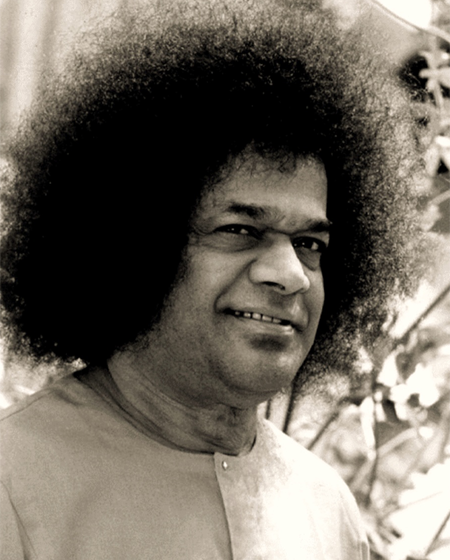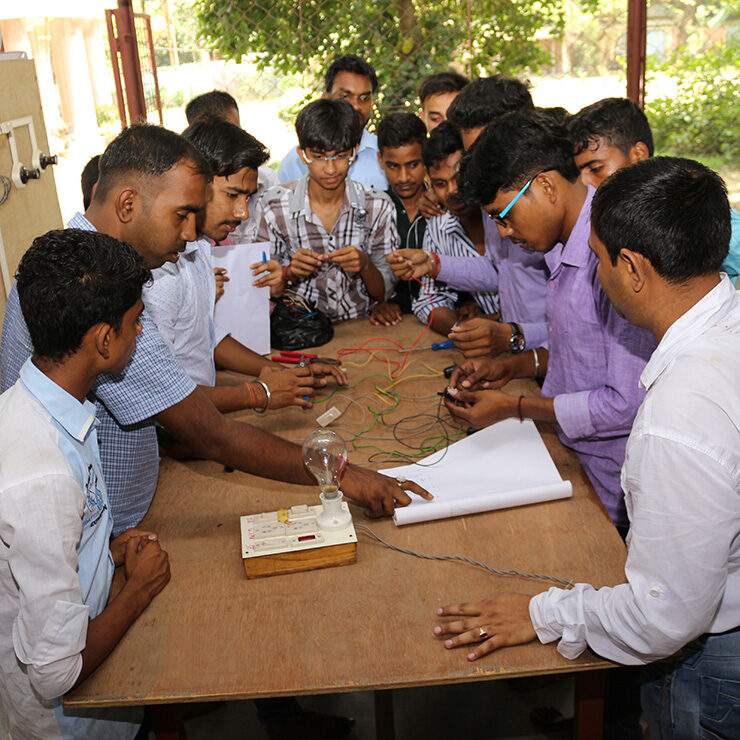A Metaphysical reconstructive insight into the modern-day
problems of humanity
Introduction

He does not realise that it is only a myth. An individual cannot remain happy without all others around him being happy. Each individual is a unit of this creation and every one of us is strung together with each other by the invisible cosmic thread of universal consciousness just as the beads of a rosary are strung together with the thread which is not visible but is the fundamental truth and basis of the rosary. Therefore, if one bead suffers or struggles for survival, the existence of the rosary and consequently the other beads is verily threatened.
Nature is more progressive than man, and to protect Nature, man has to exploit it within limits. When man tampers with Nature recklessly, it reacts adversely and trouble arises. In order to protect Nature, man has to practise ceiling on desires. He should not trigger the negative aspect of Nature. In this respect, scientists have no concern for the harmful effects that may accrue to society by their inventions. They do not care for the welfare of mankind and go on making use of intelligence to produce their weapons of destruction. Care should be exercised in providing comforts, as excessive comforts may spoil man's mind and cause misery instead of happiness. "Na Shreyo Niyamam Vina" (Nothing good can be achieved without certain restraints).
– Sri Sathya Sai,
- Sri Sathya Sai,
Divine Discourse, 14 December 1958
Desires - What Are They?
Uncontrolled Desires and Their Consequences
If we deeply contemplate, we will realise that desire is the sole cause of sorrow and distress. Any unfulfilled desire steals away peace and creates an imbalance within, making us restless to the extent that we lose discrimination and end up fulfilling the desire even through undesirable means. Thus, desires are capable of leading Man astray.
Most often, desires ultimately turn into greed and result in anger. It is the fuel for the furnace in which attachment, ego and jealousy are produced. Thus, out of the six enemies of Man that keep him away from progressing on the path of righteousness and happiness, desire lies at the bedrock and that is why Sri Sathya Sai Baba says, “Desire is storm, Greed is whirlpool, Pride is precipice, Attachment is avalanche, and Ego is volcano. Discard desire and you will be liberated.”
Desires and Mother Nature


https://unstats.un.org/sdgs/report/2022/SDG_report_2022_infographics.pdf.
- Sri Sathya Sai,
Divine Discourse, 21 February 2001Once a greedy person owned a duck, which used to lay a golden egg every day. One day, he ripped open the stomach of the duck thinking that he would get many golden eggs at a time. Today man also is indulging in such foolish and greedy acts. Instead of being satisfied with what Nature is giving him, he aspires for more and more, and in the process, he is creating imbalance in Nature.
– Sri Sathya Sai,
Ceiling on Desires – the Only Sustainable & Effective Solution

You have to exercise a ceiling on your desires. There are rules for a ceiling with regard to land and property. But you have no ceiling on your desires. Ceiling on desires means exercising control over them. You can be happy once the desires are controlled
- Sri Sathya Sai,
Your life is a long journey. You should have less luggage (desires) in this long journey of life. Therefore it is said, “Less luggage, more comfort, makes travel a pleasure.” So, ceiling on desires is what you have to adopt today. You have to cut short your desires day by day. You are under the mistaken notion that happiness lies in the fulfillment of desires. But, in fact, happiness begins to dawn when desires are totally eradicated
- Sri Sathya Sai,
“Desire makes man forget his real nature and reduces him to the status of a beast. It robs him of all his virtues and jeopardises his honour and reputation.”
- Sri Sathya Sai
Summer Showers in Brindavan, May 1979Wherever you look today, there are only desires, desires, and more desires. Put a ceiling on these desires! Only then will your mind become steady. You say, “I want this, I want that,” etc. Thus you develop many wants. They are like passing clouds. Why should you multiply your wants, these passing clouds? Ultimately, nothing accompanies you at the time of your leaving this mortal body.
- Sri Sathya Sai,
Ceiling on Desires – How?
‘Waste not; Want not’ is the mantra given by Sri Sathya Sai Baba which is the underpinning of the concept of ‘Ceiling on Desires’.
There is a limit for everything in this world. There is nothing without limit. In fact, the world is a "limited company". What will happen to the limited company if it crosses its limits? Hence, everyone should conduct himself within his limits. When a doctor prescribes a particular medicine to a patient, he also indicates the dosage. If the patient takes the medicine without regard to the dosage and exceeds the limit, he may contract another disease. Similarly, God has set a limit for every individual. But modern man has limitless desires. It is necessary that he keeps his desires within limits. He will be put to great danger if he exceeds this limit out of his ego. Whether it is the individual or society or the world, all should observe the prescribed limits.
- Sri Sathya Sai,
Practising Pillar I

Practising Pillar II
The second instruction is “Don’t waste money. God is wealth.” Since God is wealth, misuse of money is evil. Practice charity by gifting away money, food, clothes, houses, etc., instead of misusing money in extravagance. Misuse of money is not only evil but a sin as well. The third instruction is “Don’t waste time. Time waste is life waste.”
God is exalted as time. He is beyond time, transcends time and is the embodiment of time. Spend the time by using sanctifying words. Do not waste time. Wasting time is wasting God. The fourth instruction is “Don’t waste energy.” People waste their energy by indulging in bad thoughts, seeing bad things, hearing bad things, and taking bad actions.
The right royal road is the following:
- Sri Sathya Sai
Divine Discourse, 24 March 1993Do not waste Food, consume optimally
Do not waste Money, spend it diligently

Don’t waste money. God is wealth.” Since God is wealth, misuseof money is evil. Practice charity by gifting away money, food, clothes, houses, etc., instead of misusing money in extravagance. Misuse of money is not only evil but a sin as well
– Sri Sathya Sai,

- Plan your essential expenses and set a budget; strive not to exceed the set amount.
- Do not spend on things that are not needed; put an end to making impulsive purchases
- Do not spend all that you earn; put some money into savings
- Do not take loans for unproductive expenses; avoid credit cards
- Help others in need.
Today our lives are tainted by a desire for wealth. Wealth makes a man intoxicated and mad. Money is necessary but it must have a limit. Excessive money can be harmful to the 'mind. It is more difficult to spend money than to earn it. It is even more difficult to take care of money. This difficulty has an advantage - put the money to good use by spending it for the rural folk and people in distress. It is not 'Dhanamoolam idham jagath' (money is the basis of this mundane world) but 'Dharmamoolam idham jagath' (righteousness is the basis of this world). If money grows, unrest also grows.
- Sri Sathya Sai,
Do not waste Time, utilise it effectively
Today we waste time on unnecessary and unwanted things, in indulging in unnecessary talk and doing meaningless actions. In all these actions we are sacrificing the body to time. Instead we should try to make time our servant. It means spending our time in good thoughts and good deeds. Every second of your daily existence you must ask these questions: “How am I utilizing time? Is it for a good or bad purpose?”
– Sri Sathya Sai,

- Prioritise and allocate time according to priorities
- Plan properly; poor planning is a time waster
- Avoid procrastination; in doing something, the hardest task is to get started.
- Think about what regrets you might have for not accomplishing something that you ought to
- Avoid unnecessary indulgence in social media
- Allocate some time for service activities and helping others.
Do not waste energy, conserve it assiduously

- Do not leave any electrical equipment like fan or light etc. running unnecessarily
- Do not always use your car to commute. Make use of public transport, where feasible pool, the commute to save energy.
- Do not indulge in gossiping or speaking about others.
- Practice silence whenever possible and if feasible, for a day, every week
- Control and avoid anger
- Indulge in good thoughts
- See good, be good, do good
- Read good literature.
- Sri Sathya Sai
Divine Discourse, 21 November 1999Call to Action: Individual Social Responsibility
“When there is righteousness in the heart,
there is beauty in character;
When there is beauty in character,
there is harmony in the home;
When there is harmony in the home,
there is order in the nation;
Where there is order in the nation,
there will be peace in the world.”
Though man is eager to attain peace, he confronts many obstacles in the path. Those who travel by train may be well acquainted with the slogan “Less luggage, more comfort, makes travel a pleasure.” Now, man is burdening himself with limitless desires. Because of this extra heavy luggage of desires, he finds it extremely difficult to carry on the journey of life. By such proliferation of desires, he loses his balance, moves far away from his goal, and even tends to go mad.
It is for this reason that I have been stressing the need for ceiling on desires. By limiting your desires, you can attain peace to a certain extent. You have to exercise a check on your desires and make efforts to get the grace of the divine.
- Sri Sathya Sai
Divine Discourse, 25 April 1998Individual Social Responsibility Indicators
| Resource | Indicative questions |
|---|---|
| Food | 1. Is my plate left clean without any food going to waste after I have finished eating? |
| 2. How often do I overeat? | |
| 3. How much of the food that I eat is unprocessed, unpackaged or locally grown? | |
| 4. How often does my household trash contain perished food or food items that could not be consumed | |
| 5. Do I share food with the needy and the hungry? | |
| 6. Do I keep the tap of the wash-basin open while shaving or applying soap on my face or brushing my teeth? | |
| 7. Do I throw water as waste? | |
| 8. Can I reduce the amount of water I consume in taking a bath? | |
| Money | 9. Do I have more pairs of shoes or other similar items than I can actually survive with? |
| 10. How many watches do I have? | |
| 11. How many mobile phones do I use? | |
| 12. How often do I change my mobile phone? | |
| 13. How often do I purchase household appliances or electronic gadgets? | |
| 14. How frequently do I eat out? | |
| 15. How often do I purchase new clothes? | |
| 16. Do I regularly use my money for helping people in need? | |
| 17. What is the amount of money that I think I can save annually by avoiding unnecessary expenses? | |
| 18. What percentage of my earnings do I save regularly? | |
| Time | 19. How regular I am in completing my tasks on time? |
| 20. Do I procrastinate? If yes, how often? | |
| 21. How much time do I spend daily on various social media platforms? | |
| 22. Do I spend time on tasks or pursuits that can be avoided or are unnecessary? | |
| 23. Do I allocate time for good deeds and service activities? | |
| 24. How much time do I spend reading unnecessary literature or novels? | |
| Energy | 25. How often do I indulge in gossiping or talking ill about others? |
| 26. Do I spend time watching unnecessary things on TV or other platforms? | |
| 27. How often do I get angry? | |
| 28. Do I think of harming someone? | |
| 29. How much time do I spend praying and thinking good of others? | |
| 30. For what amount of time do I practice silence daily? | |
| 31. How much paper or plastic do I recycle? | |
| 32. How far do I travel by car or motorcycle each week? | |
| 33. Do I drive where I can easily walk? | |
| 34. When I travel by car, how often do I carpool? | |
| 35. How much of my total travel do I undertake on public transportation? | |
| 36. How many hours do I fly each year? | |
| 37. How many hours of air conditioners do I use that can be avoided? |





































